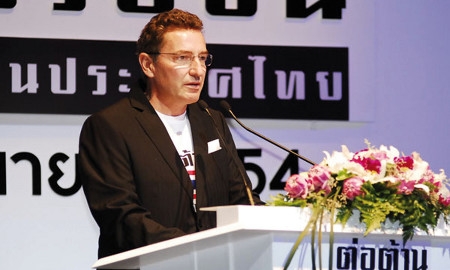One of Thailand’s many strengths is its diversity. A highly regarded tourism destination, some people’s idea of the country comes from their travels and experience of “Smiling Siam’s” renowned hospitality, culture and cuisine, while others who have industrial or commercial connections in Thailand understand first hand the business potential and opportunities it holds. For example, it is a major rice, rubber and tapioca exporter and has also established itself as a prime supplier of parts for the auto industry.
“Throughout history Thailand has been committed to freedom in terms of trade and allowing the private sector to flourish. Even in modern times, the growth strategy has been based on open markets, allowing private sector dynamism to drive the economy, rather than it being government-led and planned,” says Abhisit Vejjajiva, Leader of Thailand’s Democratic Party.
“Because of that openness, we have been able to absorb trends, values and cultures from abroad, and make them our own. Walking around you can see many things that are uniquely Thai, but made up of Chinese, Indian and Western influences. That is the kind of society that we have, and is then able to be very adaptable and flexible, which is what you need in times of rapid change.”
Such characteristics have also been noted in the country’s economy and business community over the years, having shown hardiness and pliancy during times of natural and political adversity.
“Thailand is a very interesting place because it has gone through some tumultuous times and proven resilient,” says Nandor von der Luehe, Chairman of the Joint Foreign Chambers of Commerce (JFCCT), which consists of 28 foreign chambers representing more than 8,000 companies. Billed as a link between the private sector and the government, it is an umbrella organisation for the foreign business community in Thailand and works with the Thai government and various government agencies such as the Board of Trade, Board of Investment (BOI) and the Federation of Thai Industries.
Mr von der Luehe believes the business services and transportation and logistics sectors are ripe for development. “The service sector should be looked at as the new locomotive to generate growth and to pull the economy, as it can bring innovation, productivity enhancements and greater national wealth,” he says.
With the integration of the ASEAN Economic Community (AEC) in 2015, Thailand is striving to improve its standing as a knowledge-based economy. As such, the BOI is pushing for a greater emphasis on research and development (R&D). At the moment, only around 0.25 per cent of Thailand’s GDP is spent on R&D, compared to an average of 2 per cent in OECD countries and around 3.7 per cent in Japan and Korea. Neighbouring Malaysia spends three times as much as Thailand on R&D.
In Thailand there are about 12,000 medium-sized companies and about 2.8 million small companies. “Small companies do not have the resources to spend on R&D and access to finance is one of the key reasons why they were not spending enough [on it], so it is a vicious circle. The second reason is that there are not enough talented people,” says Mr von der Luehe.
The new five-year strategy from the BOI for investment promotion – labelled Unparalleled Opportunities – includes numerous tax incentives for investors, particularly for activities that enhance R&D and Thai skills, whether through in-house training programmes, in cooperation with an educational or research institution, or via a donation to the Technology and Human Resources Development Fund.
“You have to think about what you have on hand. What is your strong point? As far as Thailand goes, we are the leader of agricultural production like rice, tapioca, sugar, etc. In addition, we have a strong level of tourism with a great reputation for culture and hospitality,” says entrepreneur, former politician and Chairman of the Lawn Tennis Association Suwat Liptapanlop. “With new technology and R&D, we have been able to turn agricultural products like sugar cane, tapioca, and palm oil into energy sector products, such as ethanol and biodiesel. So now you see the price of the agricultural products are rising thanks to their energy value. In the past five years, agricultural production in Thailand has gone up about 200 per cent.”

0 COMMENTS